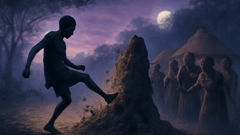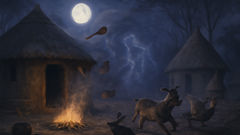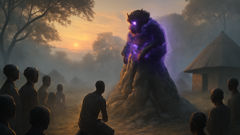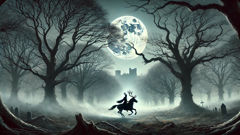Introduction
The rolling hills of KwaZulu-Natal shimmer under a pale moon, their emerald slopes blanketed in silence except for the distant hum of cicadas. Nestled within this landscape lies eMakhosini, a humble Zulu village encircled by dense forests and the meandering uMfolozi river. Here, thatched-roof huts cluster in tight embrace, smoke drifting lazily from evening fires, and the scent of roasted maize and burning wood lingers in the cool night air. Generations have called this land home, drawing their stories from the soil and the spirits that dwell beyond the veil of sight. For the people of eMakhosini, these stories aren’t mere echoes of the past but living warnings, woven into every shadow that flickers across their thresholds. Among all the tales whispered by elders as embers glow and children press close, one story is spoken with particular caution—the legend of the Tikoloshe, the mischievous spirit who walks unseen. In this place, belief is not taken lightly, and respect for what cannot be seen is stitched into the fabric of daily life. For it is said that to mock the spirits is to invite their wrath, and to wrong a Tikoloshe is to awaken its thirst for justice. Tonight, as the wind stirs the reeds along the riverbank and an owl calls from the darkness, a tale of pride, anger, and ancient magic is about to unfold—a story that will bind the fate of a village to the vengeance of an invisible being.
The Disrespectful Deed
Even in the tranquility of eMakhosini, where the mornings were serenaded by weaverbirds and evenings by the lull of frogs, not every heart was in harmony with tradition. Among the villagers, a man named Sipho stood out for his laughter, which was louder than most, and his tongue, which was often sharper. Sipho had always considered the old stories amusing, relics of an age when people feared their own shadows. He was clever, strong, and quick with his hands, but he wore his disbelief like a badge, mocking the tales of his ancestors to draw laughter from his peers.

One evening, as families gathered around the great fire at the center of the village, the air thick with anticipation for another tale, the respected elder MaDlamini began to recount the story of the Tikoloshe. She spoke of a small, hairy creature with a single eye, a spirit known for mischief and anger when disrespected. Her voice dropped to a hush, and even the crackling fire seemed to quiet. But Sipho, sitting with a group of younger men, could not contain himself. He snorted with laughter and declared loudly that no Tikoloshe would dare show itself to him. To prove his point, he strutted to the old termite mound at the edge of the village—a spot believed to be home to spirits—and kicked it apart with his bare feet.
The crowd gasped. MaDlamini’s face was a mask of sorrow and fear. "Sipho! You must apologize! The mound is sacred—those are not for us to disturb!" she pleaded. But Sipho only laughed again, waving his hand dismissively. "Let the Tikoloshe try to frighten me! I’ll show it who is master here." The hush that followed was heavy, as if the very earth was holding its breath. That night, as Sipho lay in his hut, the wind howled through the reeds like a warning. The moon slipped behind clouds, and a deep chill crept over eMakhosini.
The next morning dawned bright, but the village felt uneasy. Chickens scattered, dogs barked at empty air, and elders muttered about omens. Sipho awoke groggy and irritable, his dreams haunted by small, unseen hands tugging at his blanket. He shrugged it off, certain it was nothing. But as he walked to the river with his calabash, the birds grew silent. A shadow darted at the edge of his vision—gone when he turned his head. He told himself it was nothing, but doubt began to nibble at his bravado.
That afternoon, as Sipho worked in the maize field, his tools vanished one by one. He cursed the lazy boys he suspected of stealing them, but they were nowhere to be found. When he went to MaDlamini to complain, she only shook her head. "You have angered the Tikoloshe, Sipho. It will not end until you set things right." He scoffed, but her words clung to him as dusk approached. And as night fell, the true chaos began.
The Unseen Visitor
As the sky deepened to indigo and the stars blinked awake, the mood in eMakhosini shifted from unease to dread. Shadows seemed to slither between the huts, and the air grew colder than was natural for this time of year. Children were herded indoors, their mothers whispering prayers and hanging protective amulets above the doorways. Elders circled the fire, casting glances into the darkness, eyes searching for movements that defied explanation.

Sipho, undaunted, sat outside his hut, a half-finished gourd of umqombothi in hand. He scoffed at the nervousness of his neighbors, but beneath his bravado, his heart thudded with a strange unease. As he lifted his drink, it was knocked from his hand by something invisible. The liquid spilled onto the ground, and from the darkness came a low, guttural chuckle. Sipho stood up abruptly, scanning the shadows. "Who’s there?" he barked. Only silence replied.
That night, the village was visited by a series of uncanny disturbances. Doors slammed in empty huts. Fires snuffed out on their own. The air hummed with strange laughter, and even the bravest dogs whined and hid beneath mats. The children could not sleep, and even the grown men avoided the darkest paths. MaDlamini, sensing what was unfolding, instructed the women to burn wild sage and sprinkle salt at their thresholds.
But Sipho’s torment was just beginning. His blanket, which he’d wrapped tightly around himself, was yanked from his body by unseen hands. He felt a cold breath on his ear and heard the whisper: "You were warned." Throughout the night, invisible fingers tickled his feet, pulled his hair, and pinched his arms. Whenever he closed his eyes, he saw flashes of a squat, hairy figure darting just out of reach. When dawn broke, he was exhausted and humiliated.
As word of Sipho’s ordeal spread, villagers grew more anxious. The chief called a meeting. MaDlamini spoke gravely: "The Tikoloshe is angry. It seeks justice for the insult to its home. If we do not act, worse will come." The villagers debated—some afraid, some skeptical. But as the day wore on, the Tikoloshe’s mischief escalated. Cows went missing from their kraals, only to be found perched on rooftops or tangled in trees. Water jugs inexplicably shattered, and the maize stores were infested with swarms of biting ants.
With each new disaster, the villagers’ patience frayed. Accusations flew—some blaming Sipho, others fearing they too would be targeted. The chief demanded that Sipho apologize publicly, but Sipho’s pride was a heavy chain. Still, his resolve was wavering. That night, he locked himself inside his hut, desperate for rest. But as darkness fell, the Tikoloshe’s presence pressed in once more.
The Path to Justice
Sleep eluded Sipho as the wind howled and the walls of his hut creaked. He clutched a carved amulet MaDlamini had pressed into his palm—protection against spirits, she’d promised—but even its touch offered little comfort. Through the night, the Tikoloshe’s mischief intensified. A chorus of whispers echoed around him, growing louder until they became a roar. His possessions tumbled from shelves, the firepit spat cold ash, and his breath frosted in the air despite the summer heat.

When morning came, Sipho emerged wild-eyed, shadows beneath his gaze. The village met him with silent stares—no one had slept well. MaDlamini approached him gently. "Pride feeds anger, Sipho. The Tikoloshe is not evil by nature, but it cannot abide disrespect. You must seek its forgiveness." Sipho, finally beaten down by fear and exhaustion, nodded. "I will do as you say. Tell me how."
A gathering was called at the broken termite mound. MaDlamini led the villagers in song and prayer, their voices rising into the morning mist. Sipho knelt, sprinkling white ash in a circle and placing a calabash of fresh milk as an offering. With trembling hands, he spoke into the silence: "Tikoloshe, spirit of this land, I have wronged you. I mocked your power and defiled your home. I ask for forgiveness, not just for me, but for all who forget the old ways."
A hush fell. Then a cold breeze swept through, swirling the ash into shapes that shimmered with faint, purple light. For a heartbeat, the villagers glimpsed a squat figure—hairy, with a single luminous eye—standing atop the ruins of the mound. Its gaze fixed on Sipho, who trembled but did not look away. The Tikoloshe’s mouth curled into a sly smile, and its voice echoed within their minds: "Justice is not vengeance, but balance. You have restored respect. My anger is spent."
The figure faded, and warmth returned to the morning air. The birds resumed their songs. The cows returned to their kraals as if guided by invisible hands, and the maize stores were cleansed of ants. The villagers exhaled as one. MaDlamini embraced Sipho. "You have learned what many never do: humility before what you do not understand."
From that day forward, eMakhosini honored the spirits with renewed reverence. Sipho became known not for his laughter or bravado, but for his wisdom in teaching children about respect—the lesson hard-won through his ordeal. The termite mound was rebuilt and adorned with fresh flowers each season. And though the Tikoloshe was never seen again, its presence lingered—a reminder that justice in the land was woven from respect, humility, and harmony with all things, seen and unseen.
Conclusion
The story of Sipho and the Tikoloshe became more than a cautionary tale in eMakhosini—it was woven into every ritual and echoed in every song sung around the fire. For generations, parents reminded their children that pride and disrespect for the unseen world invite chaos, while humility can restore harmony even after great wrongs. The Tikoloshe was no longer merely a figure of fear, but a guardian of balance between people and the mysteries that cradled their lives. And so, on cool nights when the wind whispered through the reeds and shadows flickered at the edge of firelight, the people of eMakhosini remembered that justice sometimes wears an invisible cloak—and that the spirits of the land are best honored not with fear alone, but with respect and understanding.













